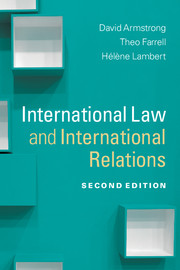Introduction
Published online by Cambridge University Press: 05 June 2012
Summary
This book is intended to introduce International Relations (IR) students to the complexities of international law. It emphasises the different ways of looking at international law, in terms of what it is, how it works and how it changes. This book is also intended to introduce International Law (IL) students to the complexities of international relations and, in particular, to the various ways that IR scholars have conceived the dominant structures, main actors and driving forces of world politics. To these ends, we seek to do three things:
(1) to situate international law in its political and historical context;
(2) to give students a foundation in the main theories of IR and IL;
(3) to enable students to apply those theories to the study of the main empirical areas of IL.
It should be immediately obvious that this is not a straight-forward, ‘black-letter’ law book. It does not seek to provide a definitive account of international law. There are a number of excellent books by eminent international lawyers that attempt to do just this. In other words, this book will not provide students with a single perspective on international law, nor will it provide a fully comprehensive guide to all aspects of international law. Rather, it seeks to develop in students a working knowledge of the various perspectives that scholars have taken on international law. Full discussion of the historical, political and theoretical contexts of international law has necessitated some sacrifices in terms of the breadth of our empirical coverage. Thus, some major topics in black-letter books on international law – such as, the law of the sea, territorial sovereignty and state responsibility – are not dealt with in this book. However, we do cover those main empirical areas where, in our judgement, international law and world politics most vigorously interact; these being, use of force, human rights, international crimes, international trade and the environment.
- Type
- Chapter
- Information
- International Law and International Relations , pp. 1 - 6Publisher: Cambridge University PressPrint publication year: 2012

